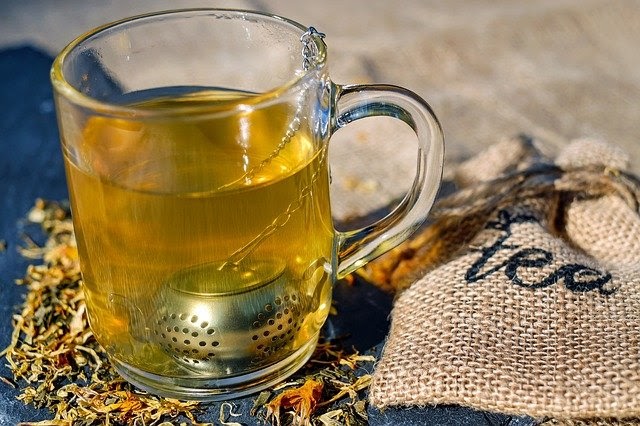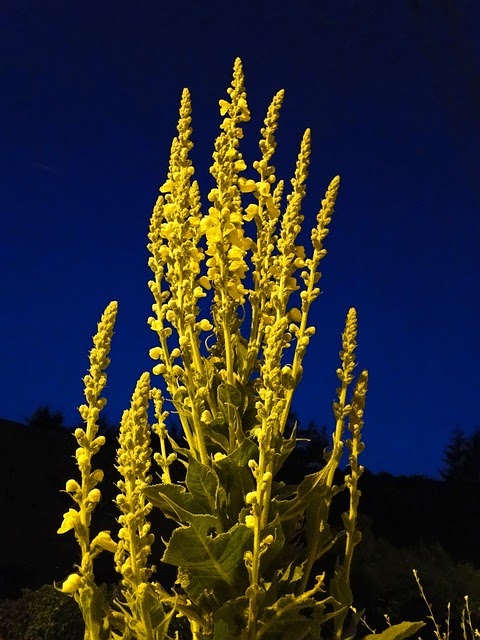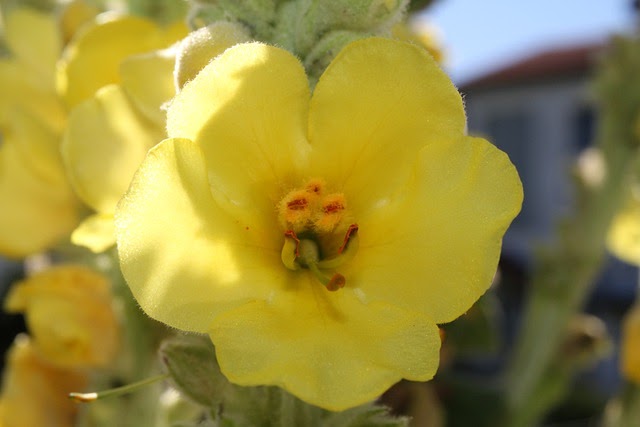
If you haven’t heard of mullein before, prepare to be amazed. There is so much to discover. Mullein is a type of plant with over 200 species, including varieties known as Aaron’s Rod and Beggar’s Blanket (its scientific name is Verbascum Thapsus), so you’ve probably seen it in a garden somewhere. It’s native to Europe and the US as well as to Asia and Africa.
The most common form of mullein has pale yellow flowers and a thick stem and grows up to seven feet tall. But as well as being an eye-catching plant for the garden, mullein has several health benefits as a tea or an oil, and has been used for thousands of years as a remedy for a wide variety of health issues.
Mullein plant medicinal uses
Tea made from the mullein plant provides benefits for anyone suffering from colds, coughs, asthma or respiratory problems. Two key properties make mullein a highly effective tool in relieving the pain, irritation and generally blocked-up feeling of these conditions: mullein has anti-inflammatory properties that soothe the nasal passages, throat, bronchial passages and lungs. It is also excellent as an expectorant – breaking down mucus and helping the body expel it to enable the body to breathe more easily.

Oil made from the mullein plant is a long-established home remedy for earache and infection. It’s also frequently used to relieve minor burns, eczema and bruises.
Mullein benefits for health
Mullein is so versatile that is has been used for centuries to bring relief from breathing problems, asthma, coughs and colds and to address lung problems. It encourages mucus to pass out of the body leaving the respiratory system clear to do its job effectively. It also relieves irritation and inflammation from these illnesses thereby reducing pain.
Mullein benefits for healing
Generations around the world have put their trust in mullein oil to help relieve painful skin conditions such as eczema and minor burns. It has also proven effective in treating earache in adults and children. Mullein tea is widely used to aid recovery from colds and coughs, asthma and other respiratory illness by reducing airway inflammation and encouraging the dispersal of mucus which can build up in our airways and lungs.
Is mullein leaf safe?
There are no reports of any major side effects from using mullein. When handling the fresh mullein plant, some people can develop an itchy rash so we recommend washing your hands immediately afterward if this occurs. When brewing tea from the plant, remember to pour through a strainer as the plant contains tiny hairs that are not nice in the mouth or throat.

Is mullein good for mucus?
Mullein’s mucus-tackling properties are widely praised by users who report that it encourages the discharge of mucus and helps to drain the membranes. This can help to relieve the symptoms of colds, coughs and more serious respiratory illnesses.
Does mullein raise blood pressure?
No, in fact it lowers blood pressure because it contains coumarins which is a natural blood thinner. You will find coumarins in many prescription blood pressure medications.
Again, please consult your doctor if you have blood pressure issues.
The best way to take mullein
Most people choose to take mullein as a tea, either shop-bought or home-made. You can find dried mullein at your local health store or online through Amazon and Etsy. Simply add a small handful of the dried mullein to a pot of boiling water and steep it for 15 to 30 minutes. Use a strainer when you come to pour it, to catch the leaves which have tiny hairs that are not so nice.
If you don’t want to wait for your tea, perhaps teabags are a better option for you. Pre-packaged mullein flower tea bags are readily available and you just treat them like any other tea.
Mullein oil is available online, at health food stores and pharmacies. It comes in a variety of sizes from 30ml upwards. Perhaps most commonly used to treat the pain and inflammation of earaches, as well as skin conditions like eczema, mullein oil has also traditionally been used for burns, bruises, and haemorrhoids. It should be applied sparingly to the skin or a few drops put into your ear. It must not be taken orally.
How does mullein work?
The key to mullein’s efficacy seems to lie in the active compounds which it contains. All of these compounds – iridoids, phenylethanoid glycosides, saponins and flavonoids – have anti-inflammatory properties. The saponins also have anti-tumour and pain-relief properties while the phenylethanoid glycosides also have antioxidant and antiviral properties that help fight influenza.
Lab studies show that mullein also has anti-bacterial properties which help with E. coli, staphylococcus aureus and klebsiella pneumoniae.
Can you take mullein every day?
There is no clinical evidence to suggest that mullein cannot be taken every day. Clearly, if you are pregnant or have an existing medical condition, it is always advisable to consult your doctor before taking a new supplement.
Leaf dosage
When using dried mullein leaves for your tea, we recommend adding a small handful to a pot of boiling water and leaving it to steep for 15 to 30 minutes. Using a pot helps to keep the tea warm. When you’ve done that, pour the tea through a strainer into your cup. The strainer keeps the leaves and tickly hairs from the plant away from your drink. If you wish, add some honey, lemon or cinnamon and enjoy.
Tea dosage
If you’re using mullein tea bags, you can treat them just like ordinary tea bags both in terms of preparing your drink and in terms of the amount you drink. We recommend that you look for tea bags that list mullein as a pure ingredient. We also choose GMO free and non-irrigated varieties. Mullein teabags typically last longer on the shelf and you can buy them in packs of 25 or 100.
Mullein supplement benefits
A cup of mullein tea helps keep inflammation at bay, particularly in the respiratory system which consists of the throat, lungs and bronchial passages. It also helps the body expel mucus which, again, keeps your nose and throat clear and helps to breathe. The major benefit of taking mullein supplements or mullein tablets rather than tea, is the convenience factor. There is no need to prepare and drink the mullein and you can instead take a recommended daily dosage via a mullein tablet.
Mullein and the Lungs
As we’ve seen, mullein is an excellent supplement if you have issues with your breathing whether temporarily with a cold, or more long-term with your lungs. One of the many mullein benefits is that it breaks down the mucus in the lungs and encourages the mucus to be expelled from your system. If your lungs and airways have been irritated by air pollution, mullein will also calm them using its natural anti-inflammatory properties.
Is mullein tea good for the lungs?
Yes it is. Many of our customers drink mullein tea to loosen the mucus that can gather in our noses, throats and lungs so that it can be expelled naturally. They also appreciate the calming effect mullein’s anti-inflammatory properties have on tired lungs.
How do you flush out your lungs?
Whether you have a long-term lung condition or you just feel that breathing poor quality air must be doing you some harm, we recommend mullein tea to ‘flush out your lungs’. Simply make a steaming mug of Mullein tea – you could even inhale the vapours as you wait for the tea to steep – and enjoy. The tea will calm your irritated lungs and also help you release any mucus that’s trapped in them. Your lungs will feel lighter and more able to breathe afterwards.
Can your lungs heal?
While we do not claim that mullein tea can, on its own, heal chronic lung conditions, our customers tell us that for lungs irritated by air pollution and mucus, mullein tea has a positive and soothing effect.
Other major mullein benefits
Mullein for the Skin
Mullein skin benefits are plentiful. The versatile mullein plant is also often used to relieve the pain of skin conditions such as eczema, minor burns and bruises. It should be applied sparingly to the skin and gently smoothed in.
Mullein for COPD (Chronic Obstructive Pulmonary Disease)
Because mullein has the ability to promote the discharge of mucus and to drain the membranes, it can be used to bring relief for some COPD symptoms. These symptoms include coughing, producing mucus and shortness of breath so mullein could be a good choice to help bring relief. We should say that many many customers use mullein in this way but it has not yet been sufficiently tested in regard to any respiratory conditions. It should be viewed as a good home remedy when incorporated into the daily treatment of any person suffering from COPD.